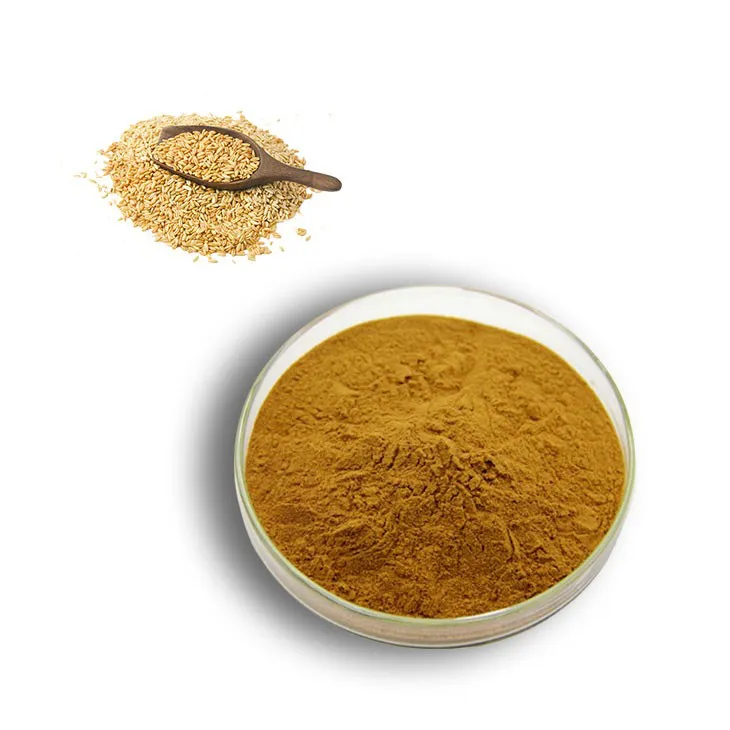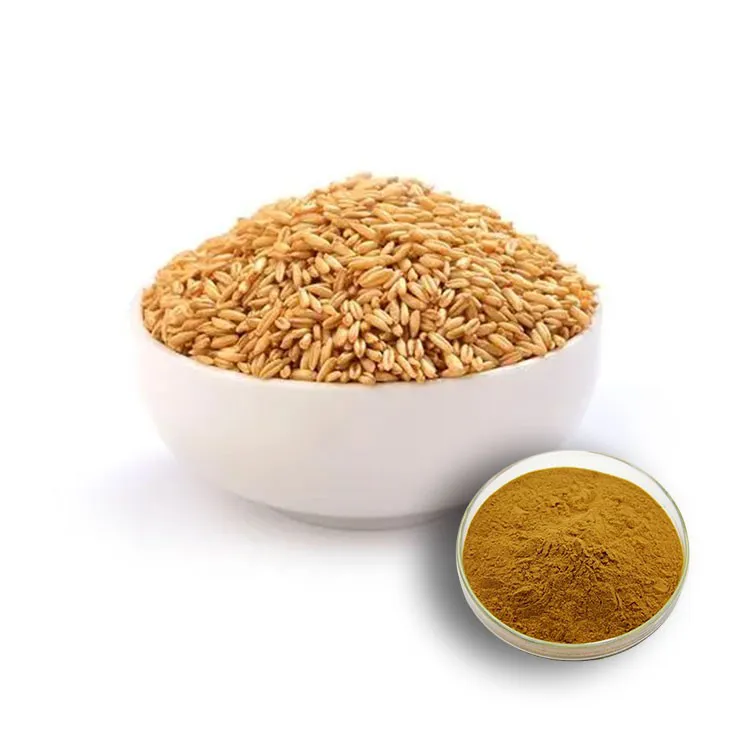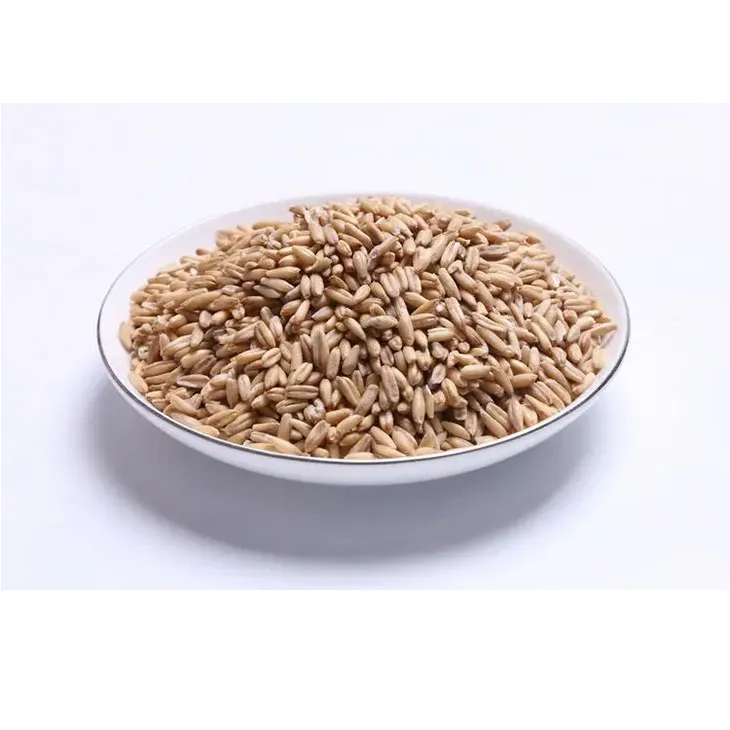- 0086-571-85302990
- sales@greenskybio.com
Can oat straw extract powder reduce cholesterol?
2024-11-12

Introduction
Cholesterol management has become a significant health concern in modern society. High cholesterol levels are associated with an increased risk of heart disease, stroke, and other cardiovascular problems. As a result, there is a growing interest in natural products that may help in reducing cholesterol. Oat Straw Extract Powder has emerged as a potential candidate in this regard. This article aims to explore whether Oat Straw Extract Powder can indeed reduce cholesterol by examining existing research, the bioactive substances it contains, and its potential mechanisms of action within the body.

What is Oat Straw Extract Powder?
Oat straw is the dried aerial part of the oat plant (Avena sativa). Oat straw extract powder is made by extracting the beneficial compounds from oat straw. It has been used in traditional medicine for various purposes. Oat straw contains a range of nutrients and bioactive compounds that may contribute to its potential health benefits, including vitamins (such as vitamin B - complex), minerals (like calcium, magnesium, and potassium), and fiber.

Research on oat straw extract powder and cholesterol
Animal studies
Several animal studies have been conducted to investigate the effect of oat straw extract powder on cholesterol levels. In these studies, animals were typically fed a diet supplemented with oat straw extract powder for a certain period.
- One study found that in rats fed a high - cholesterol diet, the addition of oat straw extract powder led to a significant decrease in total cholesterol levels. The researchers observed that the extract seemed to interfere with the absorption of dietary cholesterol in the intestines. This could be due to the presence of certain fiber components in the extract that bind to cholesterol and prevent its uptake.
- Another animal study focused on rabbits. The results showed that oat straw extract powder not only reduced total cholesterol but also had a positive impact on LDL (low - density lipoprotein) cholesterol, often referred to as "bad" cholesterol. The possible mechanism involved the modulation of lipid metabolism in the liver. The extract may have influenced the enzymes involved in cholesterol synthesis and breakdown, leading to a more favorable lipid profile.
Human studies
Although there are fewer human studies compared to animal studies on this topic, they provide valuable insights.
- A small - scale clinical trial was carried out on a group of individuals with mildly elevated cholesterol levels. Participants were given oat straw extract powder supplements for several weeks. The results showed a trend towards a reduction in total cholesterol and LDL cholesterol levels. However, the changes were not statistically significant in all participants. This could be due to the relatively small sample size and the short duration of the study.
- In another study, researchers investigated the long - term effects of oat straw extract powder in combination with a healthy diet on cholesterol levels. The participants who adhered to the regimen showed a more stable cholesterol profile over time. But again, more comprehensive and larger - scale studies are needed to draw definitive conclusions.

Bioactive substances in oat straw extract powder
Oat straw extract powder contains several bioactive substances that may play a role in cholesterol reduction.
- Beta - glucan: This is a type of soluble fiber that is well - known for its cholesterol - lowering properties. Beta - glucan forms a viscous gel in the digestive tract, which can trap cholesterol and prevent its absorption. In oat straw, beta - glucan may work in a similar way to reduce the amount of cholesterol that enters the bloodstream.
- Saponins: These are natural compounds found in oat straw. Saponins have been shown to interact with cholesterol in the gut. They can form complexes with cholesterol, reducing its solubility and thus its absorption. Additionally, saponins may have an impact on the liver's cholesterol metabolism by influencing the expression of genes related to lipid regulation.
- Flavonoids: Oat straw extract powder also contains flavonoids. These antioxidant compounds may have an indirect effect on cholesterol levels. Flavonoids can reduce inflammation in the body, and chronic inflammation is often associated with abnormal cholesterol metabolism. By reducing inflammation, flavonoids may contribute to a more balanced cholesterol profile.
How oat straw extract powder may interact with the body to influence cholesterol levels
The potential mechanisms by which oat straw extract powder influences cholesterol levels are multi - faceted.
- Gastrointestinal tract: In the gastrointestinal tract, the fiber components, such as beta - glucan, and saponins can directly interact with dietary cholesterol. As mentioned earlier, they can prevent cholesterol absorption by either trapping it or forming complexes. This reduces the amount of cholesterol that is available to be transported into the bloodstream. For example, when beta - glucan forms a gel - like substance, it can physically block the absorption of cholesterol molecules through the intestinal lining.
- Liver metabolism: The liver plays a crucial role in cholesterol homeostasis. Oat straw extract powder may influence the liver's cholesterol metabolism in several ways. The saponins in the extract may affect the activity of enzymes involved in cholesterol synthesis, such as HMG - CoA reductase. By modulating these enzymes, the liver may produce less cholesterol. Additionally, the flavonoids in the extract may help in reducing oxidative stress in the liver, which can in turn improve the overall function of the liver in lipid metabolism.
- Blood lipid transport: Once in the bloodstream, oat straw extract powder may also influence the transport and distribution of cholesterol. It may affect the function of lipoproteins, such as LDL and HDL (high - density lipoprotein, or "good" cholesterol). For instance, by reducing the oxidative modification of LDL cholesterol, the extract can make it less likely to be deposited in the arterial walls, thus reducing the risk of atherosclerosis.
Limitations and considerations
While oat straw extract powder shows potential in reducing cholesterol, there are several limitations and considerations.
- Dosage and standardization: There is currently no standardized dosage for oat straw extract powder when it comes to cholesterol reduction. Different products may contain varying amounts of the bioactive substances, making it difficult to determine the optimal dosage. This lack of standardization also makes it challenging to compare the results of different studies.
- Overall diet and lifestyle: Cholesterol levels are influenced by a complex interplay of diet, exercise, and genetic factors. Oat straw extract powder should not be seen as a sole solution for cholesterol management. A healthy diet rich in fruits, vegetables, whole grains, and lean proteins, along with regular exercise, is still essential for maintaining optimal cholesterol levels.
- Possible side effects: Although oat straw extract powder is generally considered safe, some individuals may experience side effects. These can include gastrointestinal discomfort, such as bloating or diarrhea, especially when consumed in large amounts. People with certain medical conditions, such as celiac disease or gluten intolerance, should also be cautious as oats may contain gluten - like proteins.
Conclusion
In conclusion, oat straw extract powder shows promise as a potential cholesterol - reducing agent. The existing research, both in animals and humans, along with the presence of bioactive substances such as beta - glucan, saponins, and flavonoids, suggests that it may have a positive impact on cholesterol levels. However, more research is needed, especially large - scale human trials with standardized dosages, to fully understand its effectiveness and safety. In the meantime, it can be considered as part of a comprehensive approach to cholesterol management, which should also include a healthy diet and regular exercise.
FAQ:
Question 1: What are the main bioactive substances in oat straw extract powder?
Oat straw extract powder may contain various bioactive substances. One of the key components is beta - glucan. Beta - glucan is a type of soluble fiber that has been associated with potential health benefits. Additionally, it may also contain antioxidants such as phenolic compounds. These substances play important roles in the body's physiological processes and may be involved in any potential cholesterol - reducing effects.
Question 2: How does oat straw extract powder potentially reduce cholesterol?
The possible mechanisms for oat straw extract powder to reduce cholesterol are multi - faceted. The beta - glucan in it can bind to bile acids in the intestine. When this happens, the body needs to use cholesterol to produce more bile acids, which in turn can lead to a reduction in the amount of cholesterol in the blood. Also, the antioxidants may help in reducing oxidative stress in the body, which is sometimes associated with abnormal cholesterol metabolism, potentially contributing to better cholesterol regulation.
Question 3: Are there any clinical studies on oat straw extract powder and cholesterol reduction?
Yes, there are some clinical studies. However, the evidence is not yet conclusive. Some small - scale studies have shown promising results regarding the potential of oat straw extract powder to influence cholesterol levels. But more large - scale, long - term clinical trials are needed to fully establish its efficacy and safety in cholesterol reduction.
Question 4: Is it safe to consume oat straw extract powder for cholesterol management?
Generally, oat straw extract powder is considered safe for consumption in moderate amounts. However, as with any supplement, there may be potential side effects or interactions with medications. Some people may experience mild digestive issues such as bloating or gas. It is always advisable to consult a healthcare provider before starting to take oat straw extract powder for cholesterol management, especially if you have pre - existing health conditions or are taking other medications.
Question 5: How much oat straw extract powder should be consumed for potential cholesterol reduction?
There is no one - size - fits - fits - all answer to this question. The appropriate dosage may vary depending on factors such as an individual's age, overall health, and existing cholesterol levels. In some studies, certain dosages have been tested, but more research is needed to determine the optimal amount for cholesterol reduction. It is not advisable to self - prescribe high doses without proper medical guidance.
Related literature
- The Role of Oat - based Products in Cholesterol Management"
- "Bioactive Compounds in Oat Straw and Their Potential Health Effects"
- "Clinical Trials on Dietary Supplements for Cholesterol Reduction: A Review with Focus on Oat Straw Extract"
- ▶ Hesperidin
- ▶ citrus bioflavonoids
- ▶ plant extract
- ▶ lycopene
- ▶ Diosmin
- ▶ Grape seed extract
- ▶ Sea buckthorn Juice Powder
- ▶ Beetroot powder
- ▶ Hops Extract
- ▶ Artichoke Extract
- ▶ Reishi mushroom extract
- ▶ Astaxanthin
- ▶ Green Tea Extract
- ▶ Curcumin Extract
- ▶ Horse Chestnut Extract
- ▶ Other Problems
- ▶ Boswellia Serrata Extract
- ▶ Resveratrol Extract
- ▶ Marigold Extract
- ▶ Grape Leaf Extract
- ▶ blog3
-
Cranberry Plants and Skin - care Products.
2024-11-12
-
Troxerutin
2024-11-12
-
Cassia Seed Extract
2024-11-12
-
Mango flavored powder
2024-11-12
-
Phyllanthus Emblica Extract
2024-11-12
-
Saponin Extract
2024-11-12
-
Red Vine Extract
2024-11-12
-
Lotus leaf extract
2024-11-12
-
Aguaje Extract
2024-11-12
-
Europen Bilberry Extract
2024-11-12
-
Sophora Flavescens Root Extract
2024-11-12





















